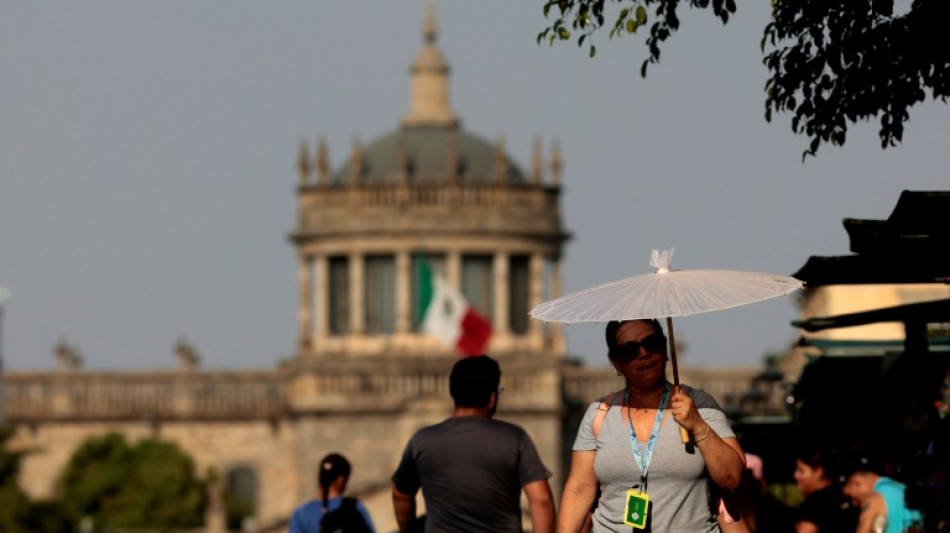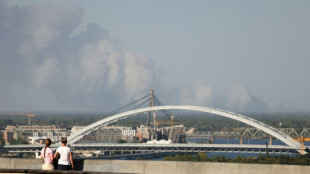
-
 Mbappe on target as Real Madrid cruise to Leganes win
Mbappe on target as Real Madrid cruise to Leganes win
-
Sampaoli beaten on Rennes debut as fans disrupt Nantes loss

-
 Israel records 250 launches from Lebanon as Hezbollah targets Tel Aviv, south
Israel records 250 launches from Lebanon as Hezbollah targets Tel Aviv, south
-
Australia coach Schmidt still positive about Lions after Scotland loss

-
 Man Utd 'confused' and 'afraid' as Ipswich hold Amorim to debut draw
Man Utd 'confused' and 'afraid' as Ipswich hold Amorim to debut draw
-
Sinner completes year to remember as Italy retain Davis Cup

-
 Climate finance's 'new era' shows new political realities
Climate finance's 'new era' shows new political realities
-
Lukaku keeps Napoli top of Serie A with Roma winner

-
 Man Utd held by Ipswich in Amorim's first match in charge
Man Utd held by Ipswich in Amorim's first match in charge
-
'Gladiator II', 'Wicked' battle for N. American box office honors

-
 England thrash Japan 59-14 to snap five-match losing streak
England thrash Japan 59-14 to snap five-match losing streak
-
S.Africa's Breyten Breytenbach, writer and anti-apartheid activist

-
 Concern as climate talks stalls on fossil fuels pledge
Concern as climate talks stalls on fossil fuels pledge
-
Breyten Breytenbach, writer who challenged apartheid, dies at 85

-
 Tuipulotu try helps Scotland end Australia's bid for Grand Slam
Tuipulotu try helps Scotland end Australia's bid for Grand Slam
-
Truce called after 82 killed in Pakistan sectarian clashes

-
 Salah wants Liverpool to pile on misery for Man City after sinking Saints
Salah wants Liverpool to pile on misery for Man City after sinking Saints
-
Berrettini takes Italy to brink of Davis Cup defence

-
 Lille condemn Sampaoli to defeat on Rennes debut
Lille condemn Sampaoli to defeat on Rennes debut
-
Basel backs splashing the bucks to host Eurovision

-
 Leicester sack manager Steve Cooper
Leicester sack manager Steve Cooper
-
IPL auction records tumble as Pant, Iyer break $3 mn mark

-
 Salah sends Liverpool eight points clear after Southampton scare
Salah sends Liverpool eight points clear after Southampton scare
-
Key Trump pick calls for end to escalation in Ukraine

-
 Tuipulotu try helps Scotland end Australia's bid for a Grand Slam
Tuipulotu try helps Scotland end Australia's bid for a Grand Slam
-
Davis Cup organisers hit back at critics of Nadal retirement ceremony

-
 Noel in a 'league of his own' as he wins Gurgl slalom
Noel in a 'league of his own' as he wins Gurgl slalom
-
A dip or deeper decline? Guardiola seeks response to Man City slump

-
 Germany goes nuts for viral pistachio chocolate
Germany goes nuts for viral pistachio chocolate
-
EU urges immediate halt to Israel-Hezbollah war

-
 Far right targets breakthrough in Romania presidential vote
Far right targets breakthrough in Romania presidential vote
-
Basel votes to stump up bucks to host Eurovision

-
 Ukraine shows fragments of new Russian missile after 'Oreshnik' strike
Ukraine shows fragments of new Russian missile after 'Oreshnik' strike
-
IPL auction records tumble as Pant and Iyer snapped up

-
 Six face trial in Paris for blackmailing Paul Pogba
Six face trial in Paris for blackmailing Paul Pogba
-
Olympic champion An wins China crown in style

-
 It's party time for Las Vegas victor Russell on 'dream weekend'
It's party time for Las Vegas victor Russell on 'dream weekend'
-
Former Masters champion Reed seals dominant Hong Kong Open win

-
 Norris applauds 'deserved' champion Verstappen
Norris applauds 'deserved' champion Verstappen
-
Jaiswal and Kohli slam centuries as Australia stare at defeat

-
 Kohli blasts century as India declare against Australia
Kohli blasts century as India declare against Australia
-
Verstappen 'never thought' he'd win four world titles

-
 Former Masters champion Reed wins Hong Kong Open
Former Masters champion Reed wins Hong Kong Open
-
Awesome foursomes: Formula One's exclusive club of four-time world champions

-
 Smylie beats 'idol' Cameron Smith to win Australian PGA Championship
Smylie beats 'idol' Cameron Smith to win Australian PGA Championship
-
Five key races in Max Verstappen's 2024 title season

-
 Max Verstappen: Young, gifted and single-minded four-time F1 champion
Max Verstappen: Young, gifted and single-minded four-time F1 champion
-
'Star is born': From homeless to Test hero for India's Jaiswal

-
 Verstappen wins fourth consecutive Formula One world title
Verstappen wins fourth consecutive Formula One world title
-
Survivors, sniffing dogs join anti-mine march at Cambodia's Angkor Wat


Climate change made deadly heat 35x more likely in US, Mexico, C. America
Deadly heat that blanketed the United States, Mexico and Central America recently was made 35 times more likely due to global warming, an international network of climate scientists said on Thursday.
The World Weather Attribution (WWA) group of scientists also said that extreme highs witnessed over that region in May and June were four times as likely to occur today as a quarter of a century ago.
The record-breaking heat killed at least 125 people in Mexico and caused thousands more to suffer heat strokes, a potentially fatal condition that occurs when the body's internal cooling mechanisms start to fail.
"We likely do not know the full picture of heat-related deaths, since they are usually only confirmed and reported months after the event, if at all," said WWA, which uses peer-reviewed methods to assess links between specific extreme events and global warming.
They said that as the world continues to burn fossil fuels and emit climate-heating greenhouse gases into the atmosphere, millions more people are expected to be exposed to dangerous levels of heat in the future.
This year has been the hottest on record and already large swathes of the world have endured blistering temperatures before the onset of the northern hemisphere summer.
Greece has notched its earliest-ever heatwave, India has suffered a month-long stretch of searing highs, while the United States is dealing with wildfires and scorching conditions.
And in Saudi Arabia, at least 900 people died during the annual hajj pilgrimage, mostly from unforgiving heat with temperatures in Mecca hitting 51.8 degrees Celsius (125 degrees Fahrenheit) on Monday.
- 'Between life and death' -
For its study, WWA analysed the hottest five consecutive days and nights during a "heat dome" that lingered over the southwest United States, Mexico, Guatemala, Belize, El Salvador and Honduras in late May and early June.
The scientists have pioneered ways to use climate models to understand how these types of extreme events have changed in a world that is 1.2 degrees Celsius warmer than in pre-industrial times.
They concluded "that human-induced warming from burning fossil fuels made the five-day maximum temperature event about 1.4 degrees hotter and about 35 times more likely".
WWA warned that if humans continue burning fossil fuels in the near term, these extremes could become more frequent still.
"The additional 1.4C of heat caused by climate change would have been the difference between life and death for many people during May and June," said Karina Izquierdo, urban advisor for the Latin American and Caribbean region at Red Cross Climate Centre.
"As well as reducing emissions, governments and cities need to take steps to become more resilient to heat," she said in a statement.
Heat is the deadliest of all extreme weather but often underestimated, experts say, with children, the elderly and outdoor workers particularly vulnerable.
In Mexico and Central America, the impacts of heat are intensified by poor housing conditions, limited access to cooling services, and for those living in informal settlements.
Extreme heat also threatens the stability of electricity supply, which is critical to the functioning of healthcare facilities.
Scientists said that extreme heat warming systems and action plans could help bolster Central America's preparedness for such events, with safety measures needed to protect outdoor workers.
Green spaces and improved infrastructure in informal settlements would also help protect the most vulnerable people, WWA added.
W.Lapointe--BTB



